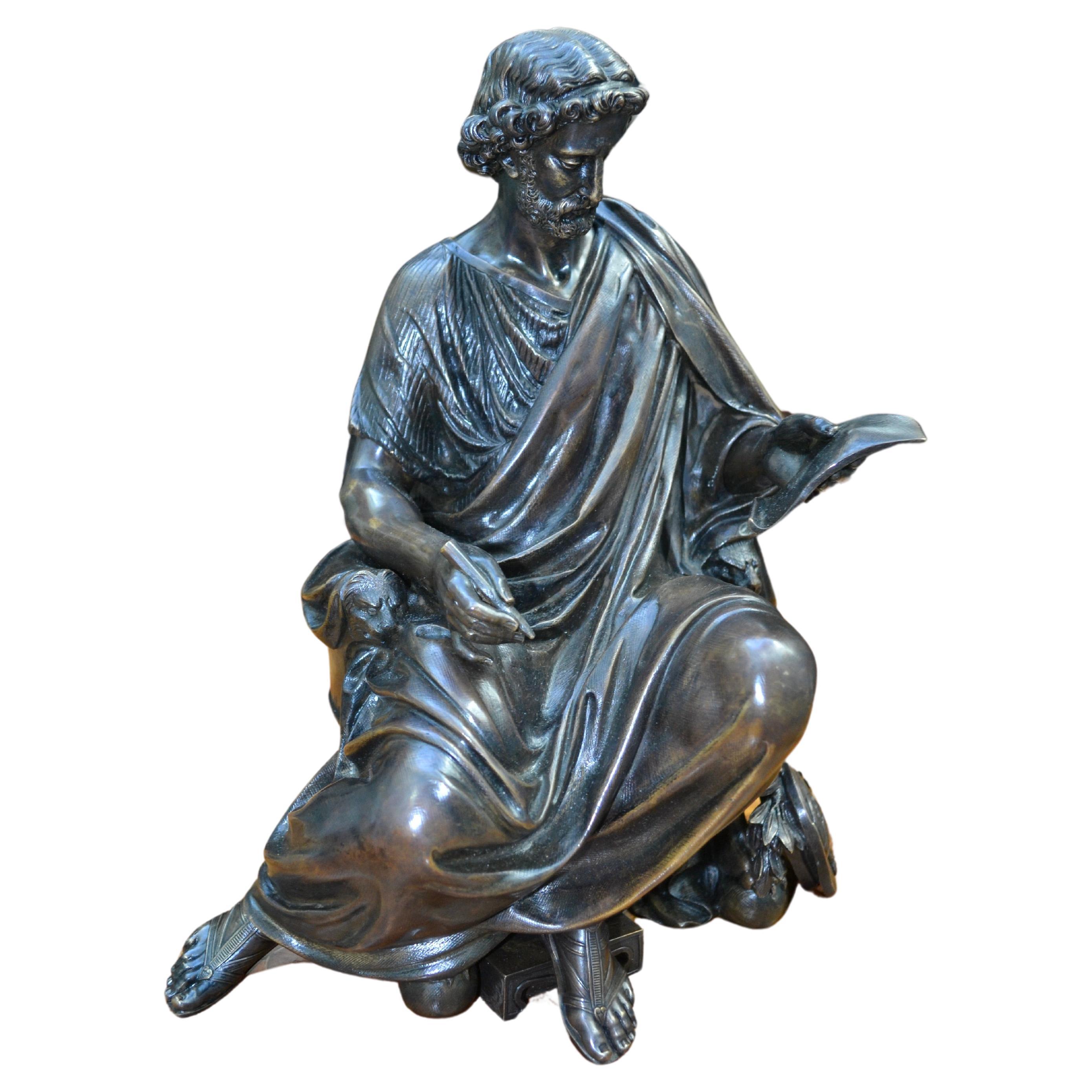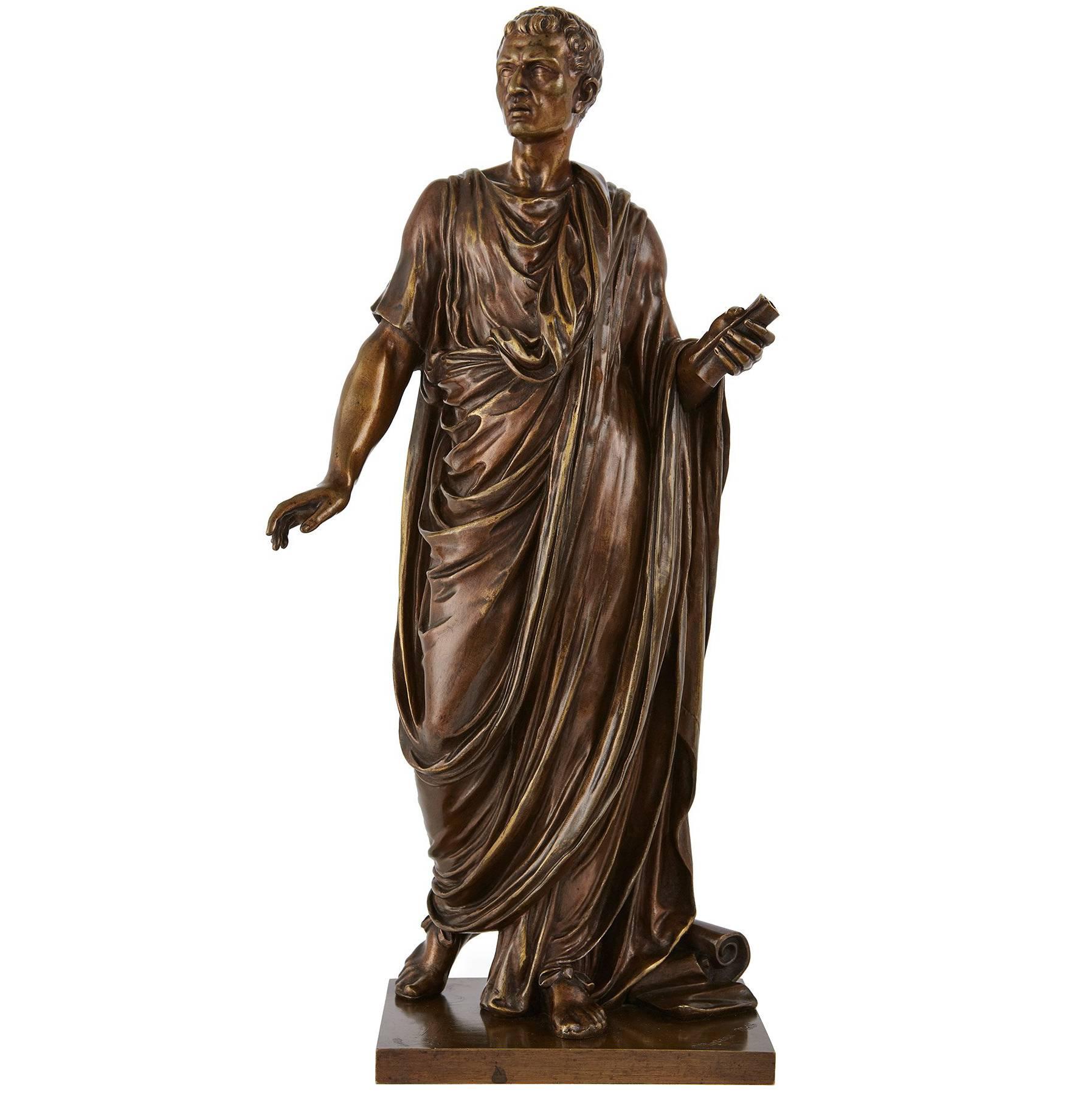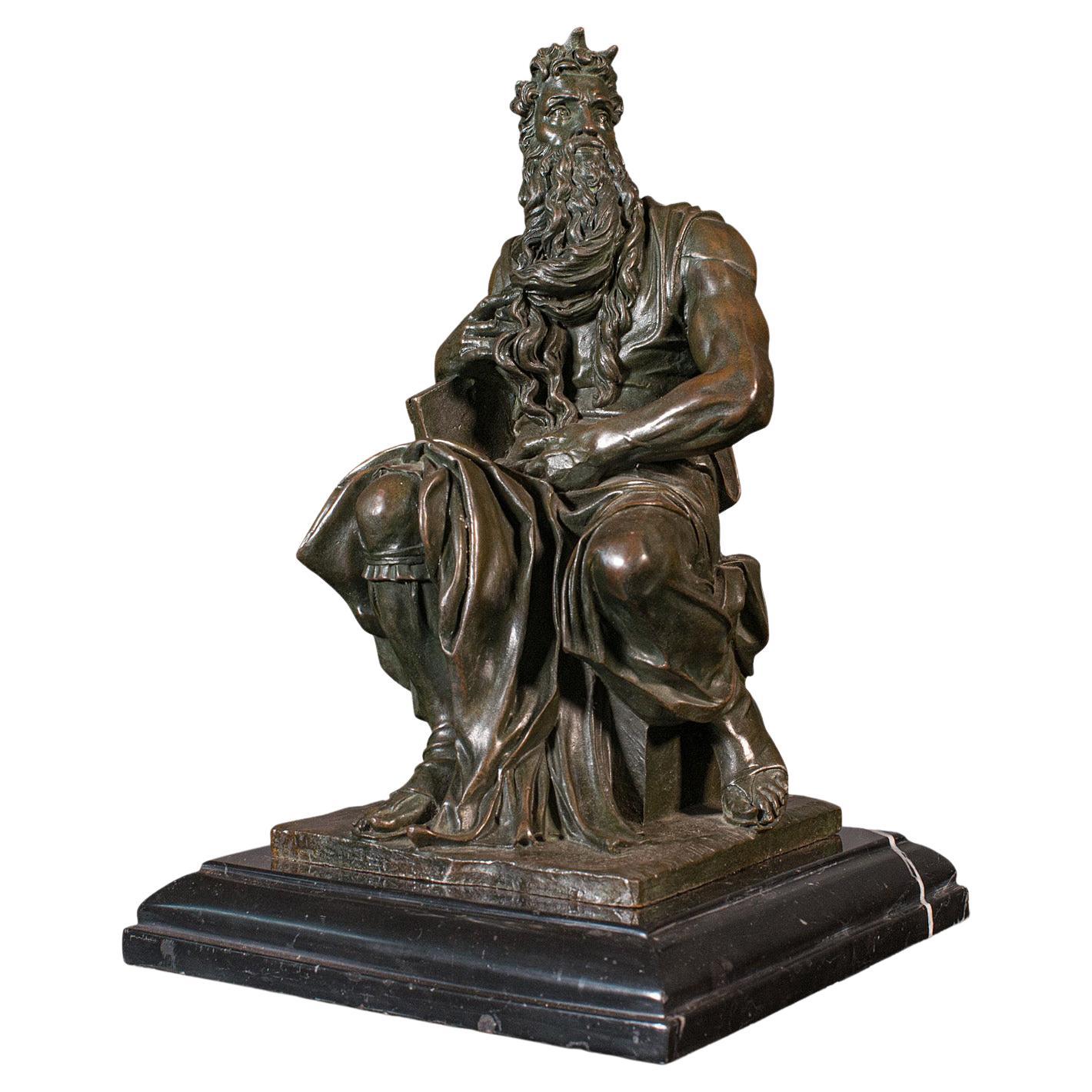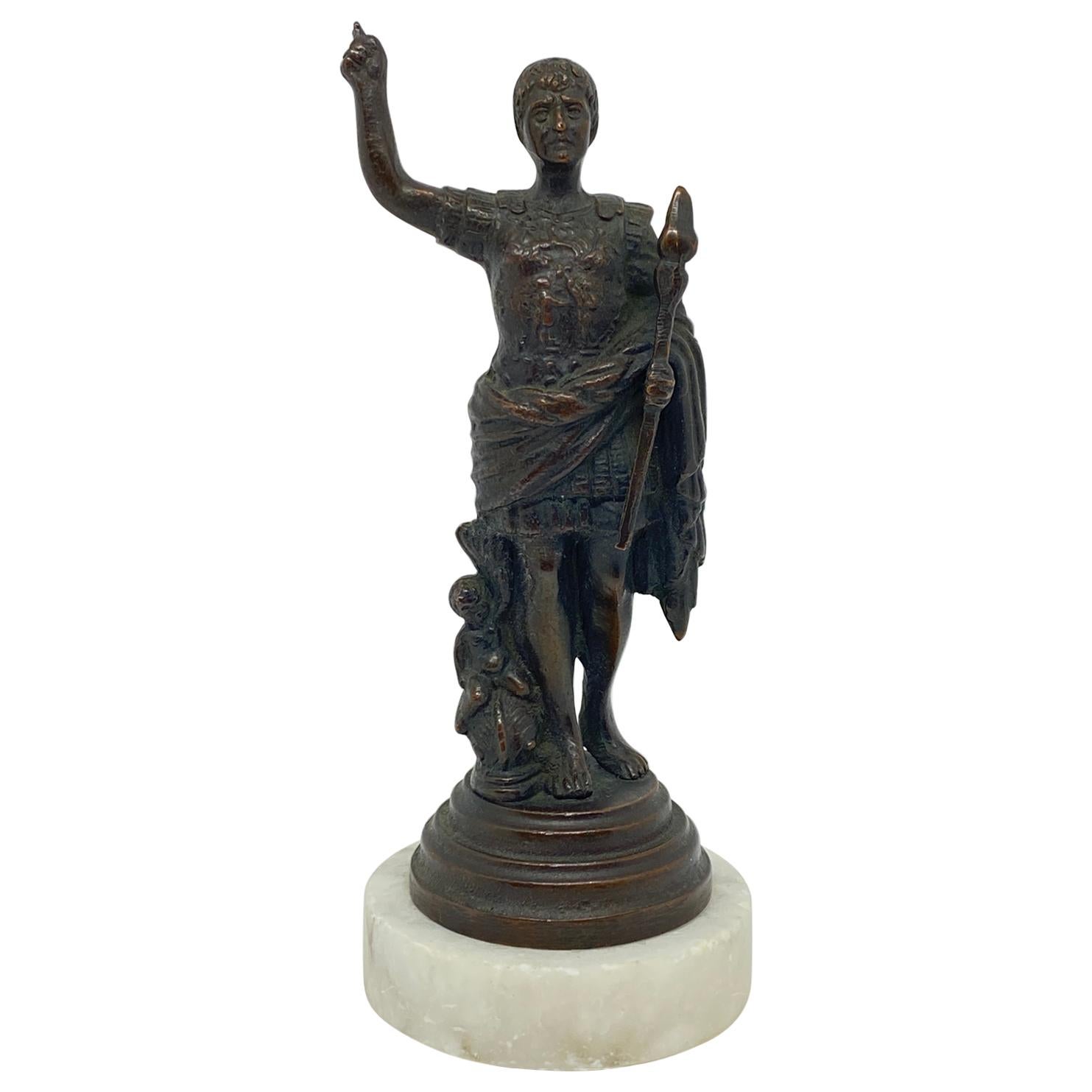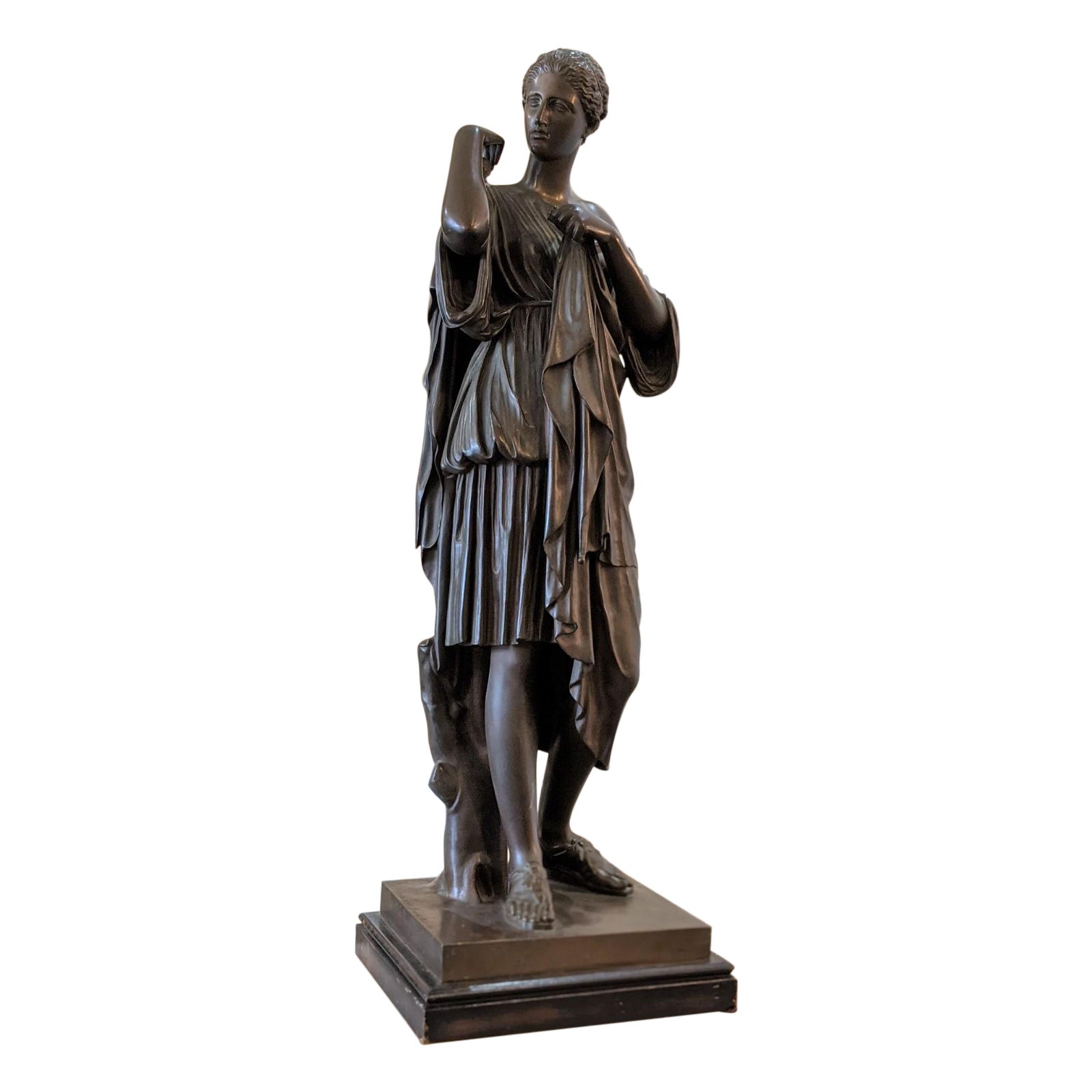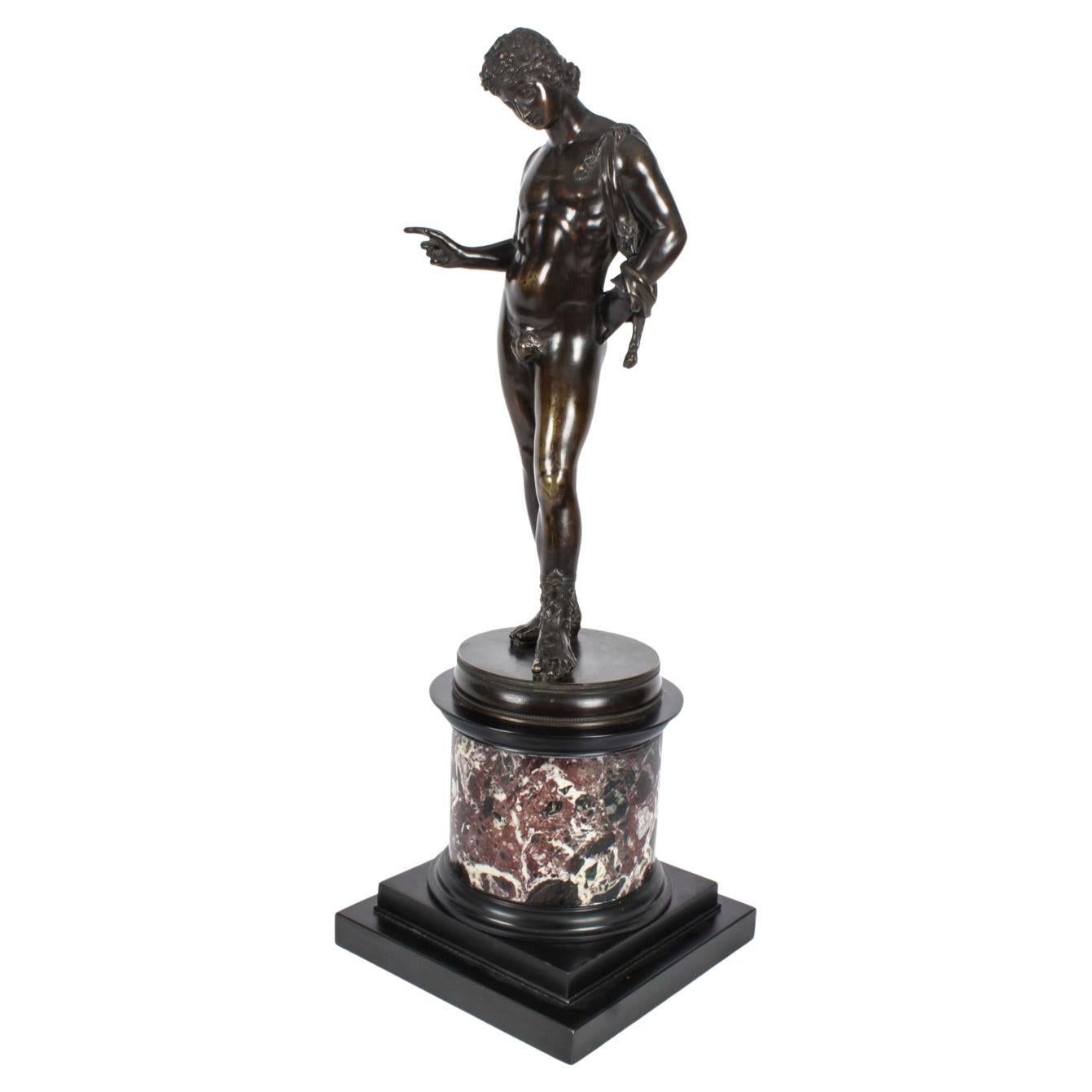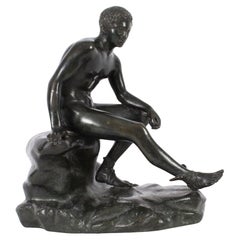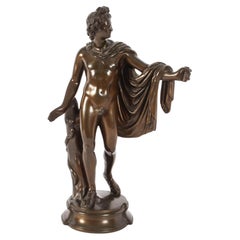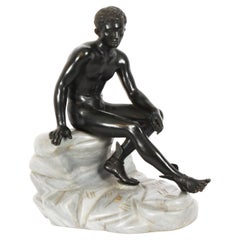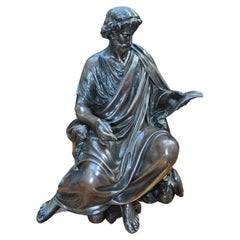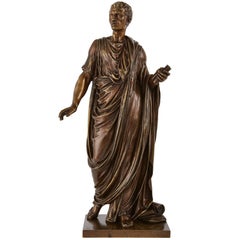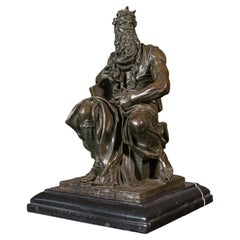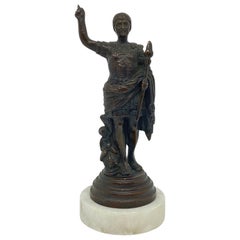Items Similar to Antique Italian Grand Tour Patinated Bronze Sculpture of St Peter, 19th Century
Want more images or videos?
Request additional images or videos from the seller
1 of 9
Antique Italian Grand Tour Patinated Bronze Sculpture of St Peter, 19th Century
$1,204.47
£875
€1,028.64
CA$1,666.19
A$1,836.26
CHF 961.34
MX$22,555.05
NOK 12,079.47
SEK 11,305.42
DKK 7,680.25
About the Item
A superb antique Italian Grand Tour patinated bronze sculpture of St Peter seated on a bronze throne, circa 1880 in date.
This patinated bronze sculpture of St. Peter is after the original by Arnolfo di Cambio (1245-1302) in St. Peters basilica in Rome. It features St. Peter seated upon a carved marble throne holding the key to heaven with his arm raised to give his blessing.
This high quality hot cast solid bronze was produced using the traditional "lost wax" process, otherwise known as the "cire perdue" method.
The craftsmanship is second to none throughout all aspects of this beautiful sculpture.
Condition:
In excellent condition, please see photos for confirmation.
Dimensions in cm:
Height 18 x width 6.5 x depth 8.5
Dimensions in inches:
Height 7.1 x width 2.6 x depth 3.3
The chair of Saint Peter (Latin: Cathedra Petri), also known as the Throne of Saint Peter, is a relic conserved in St. Peter's Basilica in Vatican City, the sovereign enclave of the Pope inside Rome, Italy. The relic is a wooden throne that tradition claims the Apostle Saint Peter, the leader of the Early Christians in Rome and first Pope, used as Bishop of Rome. The relic is enclosed in a sculpted gilt bronze casing designed by Gian Lorenzo Bernini and executed between 1647 and 1653. In 2012, Pope Benedict XVI described the chair as "a symbol of the special mission of Peter and his Successors to tend Christ’s flock, keeping it united in faith and in charity."
The wooden throne was a gift from Holy Roman Emperor Charles the Bald to Pope John VIII in 875. It has been studied many times over the years, the last being from 1968 to 1974, when it was last removed from the Bernini altar. That study concluded that it was not a double, but rather a single, chair with a covering and that no part of the chair dated earlier than the sixth century.
The chair is the cathedra of St. Peter's Basilica. Cathedra is Latin for "chair" or "throne" and denominates the chair or seat of a bishop, hence "cathedral" denominates the Bishop's church in an episcopal see. The Popes formerly used the Chair. It is distinct from the Papal Cathedra in St. John Lateran Archbasilica, also in Rome, which is the actual cathedral church of the Pope.
The Grand Tour was the traditional trip of Europe undertaken by mainly upper-class European young men of means. The custom flourished from about 1660 until the advent of large-scale rail transit in the 1840s, and was associated with a standard itinerary.
It served as an educational rite of passage. Though primarily associated with the British nobility and wealthy landed gentry, similar trips were made by wealthy young men of Protestant Northern European nations on the Continent, and from the second half of the 18th century some South American, U.S., and other overseas youth joined in. The tradition was extended to include more of the middle class after rail and steamship travel made the journey less of a burden.
The primary value of the Grand Tour, it was believed, lay in the exposure both to the cultural legacy of classical antiquity and the Renaissance, and to the aristocratic and fashionably polite society of the European continent. In addition, it provided the only opportunity to view specific works of art, and possibly the only chance to hear certain music. A grand tour could last from several months to several years. It was commonly undertaken in the company of a knowledgeable guide or tutor.
The Grand Tour not only provided a liberal education but allowed those who could afford it the opportunity to buy things otherwise unavailable at home, and it thus increased participants' prestige and standing. Grand Tourists would return with crates of art, books, pictures, sculpture, and items of culture, which would be displayed in libraries, cabinets, gardens, and drawing rooms, as well as the galleries built purposely for their display; The Grand Tour became a symbol of wealth and freedom.
Our reference: 09203.
About the Seller
5.0
Platinum Seller
Premium sellers with a 4.7+ rating and 24-hour response times
Established in 1983
1stDibs seller since 2012
1,391 sales on 1stDibs
Typical response time: <1 hour
Associations
LAPADA - The Association of Arts & Antiques Dealers
- ShippingRetrieving quote...Shipping from: London, United Kingdom
- Return Policy
Authenticity Guarantee
In the unlikely event there’s an issue with an item’s authenticity, contact us within 1 year for a full refund. DetailsMoney-Back Guarantee
If your item is not as described, is damaged in transit, or does not arrive, contact us within 7 days for a full refund. Details24-Hour Cancellation
You have a 24-hour grace period in which to reconsider your purchase, with no questions asked.Vetted Professional Sellers
Our world-class sellers must adhere to strict standards for service and quality, maintaining the integrity of our listings.Price-Match Guarantee
If you find that a seller listed the same item for a lower price elsewhere, we’ll match it.Trusted Global Delivery
Our best-in-class carrier network provides specialized shipping options worldwide, including custom delivery.More From This Seller
View AllAntique Grand Tour Patinated Bronze Figure of of David 19th Century
Located in London, GB
This is a superb large antique Grand Tour patinated bronze version of David, dating from the mid 19th Century.
The bronze statue depicts David with an enigmatic smile posed with ...
Category
Antique 1850s Figurative Sculptures
Materials
Bronze
Antique Italian Bronze Sculpture Herme Naples Italy 19thC
Located in London, GB
This is a beautifully detailed antique Italian Grand Tour bronze sculpture of Hermes, dating from Circa 1880.
Hermes is cast after the original held at the Museo Nazionale in Naples...
Category
Antique 1880s Figurative Sculptures
Materials
Bronze
Antique Victorian Bronze Sculpture of Greek God Apollo 19th Century
Located in London, GB
This is a truly magnificent antique Victorian patinated bronze sculpture of the famous Greek God Apollo, modelled upon a shaped circular socle, inscribed monogram 'NF' and numbered 2...
Category
Antique 1860s English Victorian Figurative Sculptures
Materials
Bronze
Antique Large Italian Grand Tour Bronze Sculpture Mercury Hermes 19thCentury
Located in London, GB
This is a beautifully detailed antique Italian Grand Tour School bronze figural sculpture of Hermes, dating from Circa 1880.
Mercury is cast after the original held at the Museo Naz...
Category
Antique 1880s Figurative Sculptures
Materials
Bronze
Antique Grand Tour Patinated Bronze Figure of Narcissus 1870, 19th Century
Located in London, GB
This is a superb antique Grand Tour patinated bronze figure of Narcissus, dating from the last quarter of the 19th Century.
Narcissus was a hunter in Greek mythology and he was di...
Category
Antique 1870s Figurative Sculptures
Materials
Bronze
Vintage Bronze Sculpture of Nelson 20th Century
Located in London, GB
A stunning bronze sculptures of one of Britain's greatest ever military heroes, dating from the late 20th Century.
On 21 October 1805, the Franco-Spanish fleet came out of port and...
Category
Late 20th Century Animal Sculptures
Materials
Bronze
You May Also Like
A Patinated Bronze Statue of a Seated Greek Scholar signed Moreau
By Mathurin Moreau
Located in Vancouver, British Columbia
A patinated cast bronze statue of a classically draped Greek scholar sitting sideways on a Klismos chair with the trademark griphons as front leg supports, the subject holding a pen in his right hand and an open scroll on the other left signed "Moreau" inscribed on one side of the chair. There are no visible foundry marks.
Presumably the signature stands for Mathurin Moreau, a 19 Century French sculptor born 1822, and son of noted sculptor Jean Baptiste Moreau. In 1841, the 19 year old Mathirin entered the École des Beaux Arts in Paris and, the following year, won the Second Grand Prix de Rome with his sculpture Diodemus removing the Palladium. Several of his works remain on public display in Paris, among them on the facade of the Gare du Nord...
Category
Antique Mid-19th Century French Neoclassical Figurative Sculptures
Materials
Bronze
Antique Patinated Bronze Figure of Roman Emperor by Mathurin Moreau
By Mathurin Moreau
Located in London, GB
This fine, full length figure is modelled in the contrapposto pose, a position originating from ancient Greek Classical sculpture. The visual arts uses the term 'contrapposto' to des...
Category
Antique 19th Century French Classical Roman Figurative Sculptures
Materials
Bronze
Vintage Decorative Figure of Moses, English, Bronze, Statue, After Michelangelo
Located in Hele, Devon, GB
This is a vintage decorative figure of Moses. An English, bronze and marble statue after Michelangelo, dating to the mid 20th century, circa 1960.
Striking rendition of a historic...
Category
Mid-20th Century British Figurative Sculptures
Materials
Bronze
Italian Grand Tour Bronze Statuette of Caesar Augustus, 19th Century
Located in Miami Beach, FL
The 1st century AD marble original of this bronze is now in the Vatican. That marble was excavated in 1865 near the Villa of Livia in the Prima Porta hills outside of Rome but there ...
Category
Antique Late 19th Century Italian Greco Roman Figurative Sculptures
Materials
Marble, Bronze
$680 Sale Price
20% Off
Mid-19th Century Bronze Sculpture by Ferdinand Barbedienne from France
Located in Dallas, TX
This bronze sculpture origins from France, circa 1850. Signed by Ferdinand Barbedienne.
Ferdinand Barbedienne is born on 6 August 1810. He was a French metalworker and manufacture...
Category
Antique Mid-19th Century French Figurative Sculptures
Materials
Bronze
19th-20th Century Renaissance Carved Wood Judica Figure of Michelangelo's Moses
By Michelangelo Buonarroti
Located in Los Angeles, CA
A fine and large continental 19th-20th century Renaissance revival carved walnut judica figure of "Moses with the Ten Commandments". The baroque wood carving...
Category
Early 20th Century Spanish Renaissance Revival Figurative Sculptures
Materials
Wood, Walnut
$4,950 Sale Price
23% Off
More Ways To Browse
19th Century Italian Grand Bronze
Antique Grand Tour Bronze Sculpture
Grand Tour Bronze Roman
19th Century Italian Grand Tour Bronze Sculpture
Gold Italian Display Cabinets
Italian Throne Chairs
Gold Sovereign
Marble Altar
Gold Gilt Altar
Mission Display Cabinet
The Peter Chair
Pope Chair
Antique Double Chairs
Antique Drawing Cabinet
Bronze Throne
Italian Renaissance Throne Chair
St Peter Sculpture
Wooden Throne
